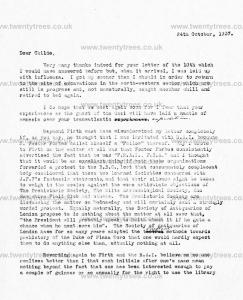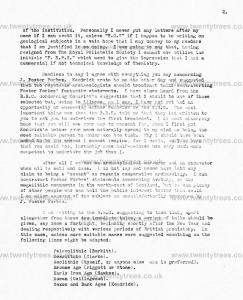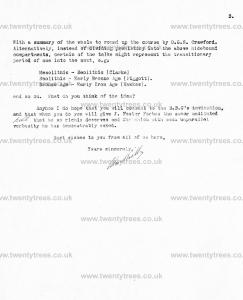Biography of Vere Gordon Childe 1892-1957
Vere Gordon Childe 1892-1957 is in Archaeologists.
On 14 Apr 1892 Vere Gordon Childe was born.
Keiller Collection Letters 24 Oct 1937. 24th October, 1937. Alexander Keiller (age 47) to Vere Gordon Childe (age 45).
Dear Childe,
Very many thanks indeed for your letter of the 10th which I would have answered before but, when it arrived, I was up with Influenza. I got up sooner than I should in order to return to the site of excavations in the north—weetern sector which are still in procreee and, not unnaturally, caugnt another chill and retired to bed again.
I do hope that we meet soon for I fear that your experiences as the guest of the Gazi will have laid a mantle of amnesia over your transatlantic [?].
Raymond Firth must have misunderstood my letter completely if, as you say, he though that I was irritated with R.A.I. becauoe J. Foster called himself a "Fellow" thereof. Why I wrote to Firth on the matter at all was that Foster Forbes (age 48) consistently advertised the fact that he was "F.R.A.I., F.S.A." that it would be an excellent thing both these organisations forwarded a protest to the B.B.C., lest that consumately complacent body considered that these two learned Societies concurred with J.F.F.s fantastic statements, and that their silence might be taken to weigh the scales against the more articulate objctions of The Prehistoric Society, The Wilts Archaeological Society, The Hampshire Field Club and others. The Prehistorlc Society are discussing the matter on Wednesdat and will certainly send a strongly worded protest. Equally naturally, the Society of Antiquaries of London propose to do nothing about the matter at save that. "the President wili probably speak to Reith about it if he a chance when he next sees him". The Society of London have for so many yeare adopted the methods towards prehistory of the Duke of Plaza Toro that one would hardly expect them to do anything else than, actually nothing at all.
Reverting again to Firth and the R.A.I. believe no one realises better than I that such initials after one'e nane mean nothing beyond the fact that one hae been interested enouch to pay a couple of guineas or so annually for the right to use the library of the Institution. Personally I never put any letters after my name if I can avoid it, unless F.G.S. if I happen to be writing on geological subjects iun a vain hope that I may convey to my readers I that I am justified in doing so. I was going to say that, having resigned from The Royal Philatelic Society I cannot now utilise the initials "F.R.P.S." which used to give the impression that I had a commercial if not technical knowledge of Chemistry.
Needless to say I agree with everything you say concerning J. Foster Forbes (age 48). Kendrick wrote to me the other day and suggested that two reputable arehaeologists should broadcast talks contraverting Foster Forbe's fantastic statements. I have since heard from the B.B.C. concerning Kendrick's suggestion that I should be one of those selected but, owing to illness, as I say, I have not yet had an opportunity of answering either Kendrick of the B.B.C. The most important this was that the B.B.C. told me they had writted to you to ask you to undertake the frist broadcast. I do most sincerely hope that you will see your way to consent for, when I first got Kendrick's letter your name naturally sprang to my mind as being the most suitable person to undertake the task. Why I should have asked to be the second I cannot imagine, for i could, as I am sure that you could too, instantly name half-a-dozen men very much more competent to undertake the job than I.
After all I but an archaeological surveyor and excavator when all is said and done. I do not lay and never have laid claim to being a "savant" as regards comparative archaeology. I can contravert Foster Forbes' (age 48) statements concerning Avebury, or the megalithic monuments in the north—east of Scotland, but so can plenty of other people who can hold the publie interest better than could I on wider aspects of the subjecty so unsatisfactorily traversed by J. Foster Forbes (age 48).
I am writing to the B.B.C. to suggesting to them that, apart altogether frocu these two immediate talks, a series of talks should be given, say once a fortnight, beginning shortly after the New Yeur and dealing respectively with various periods of British prehistory. In this case, unless more suitable names ware suggested something on the following lines might be adopted:
Palaeolithic (Burkitt).
Mesolithic (Clarke).
Neolithic (Myself, or anyone else who is preferred).
Bronze Age (Piggott or Stone).
Early Iron Age (Hawkes).
Roman (Collingwood).
Saxon and Dark Agee (Kendrick) .
With a summary of the whole to round up the course by O.G.S. Crawford. Alternatively, instead of dividing prehistory into the above hidebound compartments, certain of the talks might represent the transitionary period of one into the next,
Mesolithic — Neolithic (Clarke)
Neolithic — Early Bronze Ace ( Pit.•gott).
Bronze Age — Early Iron Ace (Hawkes).
and so on. Whnt do you think of the Idea?
Anyhow I do hope that you consent to the B.B.C's invitation, and that when you do you will give J. Foster Forbes the sheer undiluted hell that he so richly deserves and for which with sucg unparallel verbosity he has demonstrably asked.
Best wishes to you from all of us here,
Yours sincerely
John Foster Forbes: In 1889 he was born at Rothiemay Castle, Aberdeenshire. In Jul 1958 he died in the Brighton General Hospital after complications following an operation for peritonitis.



On 19 Oct 1957 Vere Gordon Childe (age 65) died.